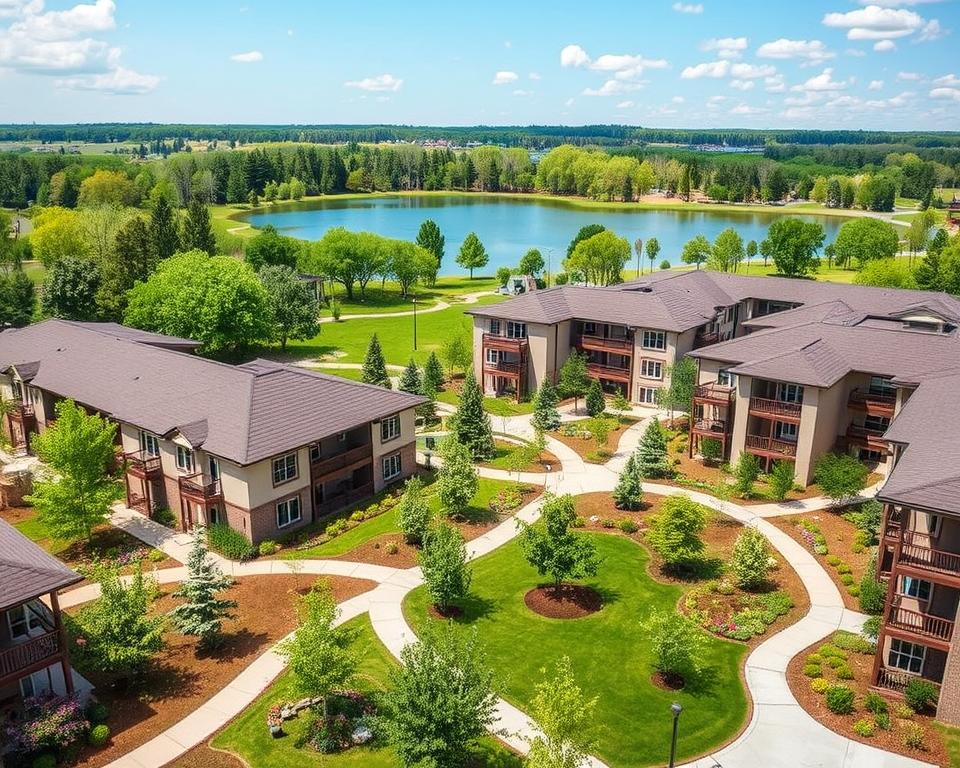Did you know that retirees who love to travel might see their expenses jump by 30% in the first few years? This fact shows how vital it is to have a solid retirement budget. It ensures you can enjoy your retirement as you dreamt.
Planning for retirement is key to financial security. It means getting ready for a longer life, sorting out your expenses, and matching them with your retirement income. A good budget helps you reach your retirement goals and enjoy your golden years fully.
Understanding the Importance of Retirement Budget Planning
Creating a detailed retirement budget is key to a secure financial future. It gives you the confidence and security you need for your golden years. With people living longer, it’s vital to plan for income and expenses over many years.
Planning your retirement budget means looking at your current spending. You’ll need to list your essential expenses and think about occasional buys. This helps you prepare for changes in lifestyle and rising costs, like healthcare and travel.
- A typical retired couple aged 65 in 2023 can expect to spend $315,000 on medical costs in retirement.
- The 80 percent rule suggests that you’ll need about 80 percent of your pre-retirement income to cover retirement expenses.
- According to the 2024 Fidelity Retiree Health Care Cost Estimate, a 65-year-old individual may need $165,000 in after-tax savings to cover health care expenses in retirement.
Retirement budget planning ensures your financial security. It helps you manage your resources and prepares you for surprises. By understanding its importance, you can take steps to secure your retirement and enjoy your golden years with peace of mind.

“Proper retirement budget planning is the cornerstone of financial security in one’s golden years.”
How to Create a Retirement Budget
Making a detailed retirement budget is key to a secure future. It’s about managing your money wisely. Here’s a simple guide to help you make a budget that works for you:
- Identify Income Sources: Start by adding up all your retirement income. This includes Social Security, pensions, retirement accounts, and any part-time jobs. Knowing your income helps you plan better.
- List Expenses: Then, list all your expenses. This includes housing, healthcare, food, and fun money. Knowing what you spend helps you plan better.
- Establish a Zero-Based Budget: Use a zero-based budget. This means your income minus expenses equals zero. It helps you use every dollar wisely.
- Plan Distributions Strategically: Think about when and how much to take from retirement accounts. This can help you save on taxes and avoid penalties.
- Track Spending Diligently: Keep an eye on how much you spend. This helps you stick to your budget and find ways to save.
By following these steps, you can make a budget that fits your goals and lifestyle. Being proactive and flexible is important for a happy retirement.
“Budgeting for retirement is not just about numbers – it’s about empowering yourself to live the life you’ve always dreamed of.”
Creating a retirement budget is an ongoing task. It changes as your needs and life do. Stay alert and adjust your budget as needed for a worry-free retirement.

Retirement is a time in your life when you can finally sit back, relax, and enjoy the fruits of your labor. However, in order to truly enjoy your retirement years, it’s important to have a solid financial plan in place. Creating a retirement budget is a crucial step in ensuring that you have enough money to cover your expenses and live comfortably in your golden years.
Here are 15 tips to help you create a retirement budget that will allow you to enjoy a worry-free retirement:
1. Start early: It’s never too early to start planning for your retirement. The sooner you start saving and planning for retirement, the better off you will be in the long run.
2. Determine your retirement goals: Before you can create a budget, you need to know what you are saving for. Determine what your retirement goals are, whether it’s traveling the world, buying a vacation home, or simply living comfortably in your golden years.
3. Calculate your retirement income: Take stock of all potential sources of income in retirement, such as Social Security, pension plans, annuities, and any other investments you may have. This will give you a better idea of how much money you will have coming in each month.
4. Estimate your retirement expenses: Make a list of all of your anticipated retirement expenses, including housing costs, healthcare expenses, travel expenses, and any other costs you may incur in retirement.
5. Be realistic: When creating your retirement budget, it’s important to be realistic about your expenses and income. Don’t underestimate how much you will need to live comfortably in retirement.
6. Account for inflation: Inflation can erode the value of your retirement savings over time. Make sure to factor in inflation when creating your retirement budget so that you can maintain your standard of living in retirement.
7. Create an emergency fund: Having an emergency fund is crucial in retirement. Unexpected expenses can arise at any time, so it’s important to have a buffer in place to cover these costs.
8. Consider downsizing: If you find that your retirement budget is tight, consider downsizing your home or making other lifestyle changes to reduce your expenses.
9. Review and adjust your budget regularly: Your retirement budget should be a living document that is reviewed and adjusted regularly. Make sure to revisit your budget every year to ensure that it is still in line with your financial goals.
10. Seek professional advice: If you are unsure about how to create a retirement budget or if you need help with financial planning, consider seeking the advice of a financial advisor.
11. Maximize your retirement savings: Take advantage of retirement savings vehicles such as 401(k) plans, IRAs, and Roth IRAs to maximize your savings and minimize your tax liability in retirement.
12. Consider working part-time: If you find that your retirement budget is not sufficient to cover your expenses, consider working part-time or taking on a side gig to supplement your income.
13. Track your spending: Keep track of your expenses in retirement to ensure that you are staying within your budget. This will help you identify areas where you may be overspending and make adjustments as needed.
14. Be prepared for healthcare costs: Healthcare expenses can be a significant cost in retirement. Make sure to account for these costs when creating your retirement budget and consider purchasing long-term care insurance to cover potential expenses.
15. Enjoy your retirement: Finally, remember that retirement is a time to enjoy the fruits of your labor. While it’s important to have a solid financial plan in place, don’t forget to enjoy your retirement and make the most of this special time in your life.
By following these tips, you can create a retirement budget that will help you achieve your financial goals and enjoy a worry-free retirement.

Identifying Your Retirement Income Sources
Planning for a comfortable retirement means looking at all your retirement income sources. This includes tax-advantaged accounts like 401(k)s, 403(b)s, and IRAs. It also includes Social Security benefits, pensions, part-time jobs, and investments.
Working with a financial expert is key to listing and analyzing your income. Social Security payments average $1,867 a month. But, this might not cover all your retirement costs alone. By diversifying your investment strategies, you can fill any gaps and enjoy a stable retirement.
- Retirement income sources may include tax-advantaged accounts, Social Security, pensions, part-time work, investments, and annuities.
- Social Security benefits average $1,867 per month, often insufficient as a sole income source.
- Consulting a financial professional can help identify and evaluate all your retirement income streams.
- Diversifying your investment strategies is key to addressing potential income gaps in retirement.
“Proactive planning can help retirees choose the best investment options to secure a stable and enjoyable retirement.”

Essential Expenses in Retirement
Creating a detailed retirement budget is vital for your golden years. You’ll need to plan for groceries, healthcare, personal care, utilities, home repairs, transportation, and giving to charity. It’s important to estimate how these costs might change to make a solid financial plan.
Healthcare costs are a big part of retirement spending. A Fidelity study found that a retired couple might need about $315,000 for medical expenses. This highlights the need to save enough for healthcare needs.
- Groceries and Household Supplies
- Utilities (electricity, gas, water, internet, cable)
- Home Maintenance and Repairs
- Transportation (car payments, insurance, gas, public transit)
- Healthcare (insurance premiums, out-of-pocket expenses, medications)
- Personal Care (haircuts, toiletries, clothing)
- Charitable Contributions and Gifts
Planning your retirement budget needs careful thought about changing expenses. You might spend 55% to 80% of your current income each year. This depends on your income, lifestyle, and healthcare costs.
“Retirement budget planning involves meticulous consideration of expenses that may fluctuate during different life stages.”

Don’t forget to include debt payments in your budget. They can affect your monthly income and flexibility. But, some costs like clothes, groceries, and gas might go down with senior discounts and less commuting. By planning for these key expenses, you can create a budget that supports your retirement dreams.
Discretionary Spending Categories
Retirement is a time to enjoy freedom and follow your dreams. But, it’s key to plan your budget well. This includes discretionary spending that greatly affects your retirement lifestyle.
The Bureau of Labor Statistics 2021 Consumer Expenditure Report shows that households with a 65+ head of household spend about $51,127 a year. This money goes into two main areas: essential and discretionary expenses.
Discretionary spending in retirement includes:
- Travel and vacations
- Subscription services (streaming, magazines, etc.)
- Gym memberships and recreational activities
- Hobbies and leisure pursuits
- Gift-giving for family and friends
- Pet care and supplies
- Clothing and personal items
These expenses can change based on your retirement lifestyle choices. Remember to include seasonal costs like property taxes and insurance. Also, don’t forget about spending for special events.
“Discretionary spending patterns may change in retirement, with potential spikes before or after retirement, likely due to activities such as house upgrades, gift-giving, or travel plans.”
Tracking your expenses and knowing your spending habits is crucial. It helps you make a retirement budget that meets your goals. This way, you can stay financially stable in your golden years.

Healthcare and Insurance Planning
Planning for retirement healthcare is key. As you get closer to retirement, knowing about Medicare and extra insurance is vital. Also, think about long-term care costs to keep your finances safe during illness.
A 65-year-old might need up to $165,000 for healthcare in 2024, says Fidelity. This shows how important retirement healthcare and insurance planning are in your retirement plan.
If you retire before 65, plan for healthcare costs until you can get Medicare. Medigap plans can fill Medicare gaps and protect you from big bills.
Don’t forget about long-term care insurance. About 70% of people turning 65 will need it. Nursing home costs can be over $100,000 a year, so plan ahead.
“Healthcare costs have been increasing at one-and-a-half to two times the rate of inflation, with a 55-year-old couple today expecting to pay over $1 million for healthcare costs during retirement.”
Understanding retirement healthcare and insurance planning helps protect your money. Whether it’s for Medicare, Medigap, or long-term care, a solid plan is crucial. It makes retirement comfortable and secure.

Housing Costs and Property Management
Retirement is a time to enjoy your golden years, but it also comes with financial considerations. Understanding retirement housing and property management costs is key. These costs can greatly affect your budgeting for retirement.
Housing expenses in retirement include mortgage payments, property taxes, and homeowners association fees. You also need to budget for home maintenance, like appliance replacement and hiring help for household chores. Remember, property taxes may go up as your home’s value increases, adding to your expenses.
If you own your home, managing it is a big part of retirement planning. You’ll need to budget for upkeep, repairs, and possibly rental income. Using a property management company can help, but their fees should be included in your budget.
“Retirement is a time to enjoy the fruits of your labor, but it’s also a time to ensure your finances are in order. Understanding and planning for housing costs and property management is a crucial step in creating a comprehensive retirement budget.”
- Carefully consider mortgage payments, property taxes, and homeowners association fees in your retirement budget.
- Factor in the costs of home maintenance, including appliance replacement and outsourcing household chores.
- Be aware that property taxes may increase over time as home values rise.
- Evaluate the potential benefits and costs of working with a property management company to handle your retirement housing.

By planning for these housing-related expenses, you can make sure your retirement budget is solid. This way, you’re ready for the financial challenges that come with this stage of life.
Transportation and Vehicle Expenses
When planning your retirement budget, remember to include transportation and vehicle costs. These can greatly affect your financial health. It’s important to think about them carefully.
Consider how long you’ll keep your current vehicle. If you plan to use it for years, think about maintenance, repairs, and when you’ll need a new one. Gas prices might go down if you don’t commute daily. But, they could rise with more travel.
Look into senior discounts on travel and transportation. These can lower the cost of trips in your retirement.
Key Considerations for Transportation Expenses in Retirement:
- Vehicle maintenance and repair costs
- Gasoline and fuel expenses
- Replacement of vehicles over time
- Senior discounts on travel and transportation
- Potential changes in driving habits and travel needs
By planning and budgeting for transportation and vehicle costs, you can enjoy your retirement. You’ll have the freedom to travel and do activities you’ve always wanted.
“The key to successful retirement planning is to create a realistic budget that accounts for all of your expenses, including transportation and vehicle costs. This will help ensure your golden years are truly golden.”

Building Emergency Reserves
Creating an emergency fund is key to for retirement. Studies show that those who face financial shocks often have less . Without enough , retirees might turn to credit cards or loans, leading to debt.
The right amount for an emergency fund varies. Experts say to save three to six months’ living expenses. Those with dependents or in unstable jobs might need more, up to twelve months.
One simple way to start an is to set up automatic transfers. Use tax refunds or cash gifts to boost your savings quickly.
- Regularly check your savings to stay motivated.
- Use employer contributions to help grow your emergency fund.
- Keep your emergency fund in a separate, easy-to-access account.
- Make your savings earn interest with a high-yield savings account.
Building an is vital for financial freedom and security. It gives you peace of mind and helps you avoid financial stress. By prioritizing it in your , you protect your retirement savings and secure your financial future.

Adjusting Your Budget Over Time
Retirement planning is a journey, not a one-time task. Your budget needs to be flexible to handle changes. As you enter retirement, it’s key to regularly check and update your financial plan. This ensures you stay on track to meet your retirement dreams.
Successful retirement budgeting means being ready to make changes. This could be due to income, expense, or lifestyle shifts. Also, keep an eye on market trends, health changes, and how your retirement goals evolve.
Here are some tips for tweaking your retirement budget for retirement planning:
- Check your budget every year to spot any big changes in your finances.
- Update your income estimates to reflect changes in Social Security, pensions, or investments.
- Look at your spending again as your needs and wants change in retirement.
- Watch healthcare and insurance costs, as they can rise or change.
- Adjust your housing and transportation costs if you downsize, move, or change your living setup.
- Save for unexpected bills, like home repairs or medical emergencies, with an emergency fund.
By always keeping an eye on and tweaking your retirement budget, you can keep your finances in line with your changing retirement life and goals. This forward-thinking approach to budgeting for retirement helps you handle retirement’s ups and downs and stay financially stable for the long haul.

Creating a retirement budget is key to financial security and peace of mind in your golden years. It involves understanding your income, managing expenses, and preparing for changes. Getting professional advice and staying informed helps you plan well for retirement.
Budgeting for retirement is an ongoing task. It needs regular updates as your expenses and income change. Being flexible and ready to make changes is crucial for financial stability in retirement.
A good retirement budget is like a roadmap to financial security. It helps you manage your resources well and enjoy your retirement as you dreamed. By focusing on needs, controlling spending, and planning for surprises, you can have the retirement you’ve always wanted.
Key Takeaways
- Retirement budgeting is essential for financial security and lifestyle fulfillment in the golden years.
- Budgets should account for both current and potential future changes in spending categories.
- Separating expenses into mandatory (needs) and discretionary (wants) helps prioritize financial allocation.
- Identifying all retirement income sources, including pensions, Social Security, and portfolio withdrawals, is crucial.
- Professional guidance can help avoid distribution planning mistakes and ensure long-term financial stability.

Source Links
- Retirement Budget Planning: 9 Steps to Consider – https://www.schwab.com/learn/story/retirement-budget-planning-9-steps-to-consider
- How to Create a Retirement Budget – https://www.ramseysolutions.com/retirement/how-much-money-will-you-need-in-retirement?srsltid=AfmBOopzd7QiRyG7FEHwdAAPWKfOfgukRYyIErh9wZSyuZAjXYaBb1r6
- How to create a retirement budget – Bankrate – https://www.bankrate.com/retirement/how-to-create-a-retirement-budget/
- Budgeting in retirement | Fidelity – https://www.fidelity.com/viewpoints/retirement/retirement-and-budgeting
- Budgeting for the 4 Phases of Retirement – https://www.investopedia.com/articles/personal-finance/110315/4-phases-retirement-and-how-budget-them.asp
- How to Create a Retirement Budget That Works for You | Guardian – https://www.guardianlife.com/retirement/budgeting
- Will You Have a Retirement Income Gap? How to Fill It – https://www.kiplinger.com/retirement/retirement-income-gap-how-to-fill-it
- Sources of Retirement Income – https://www.finra.org/investors/learn-to-invest/types-investments/retirement/managing-retirement-income/sources-retirement-income
- How to Plan for Retirement | U.S. Bank – https://www.usbank.com/retirement-planning/financial-perspectives/how-to-plan-for-retirement.html
- How to Create a Retirement Budget – https://www.ramseysolutions.com/retirement/how-much-money-will-you-need-in-retirement?srsltid=AfmBOoru_68eqaeA_Dl5LJRxDI6CGifchCusOUBgYUSoPoxoreYdwr5f
- How much will you spend in retirement? | Fidelity – https://www.fidelity.com/viewpoints/retirement/spending-in-retirement
- What are the Average Retirement Expenses? | Monthly Estimate – https://www.actsretirement.org/resources-advice/finance-saving-money/saving-money-after-retirement/retirement-expenses/
- The Hidden Costs of Retirement | City National Bank – https://www.cnb.com/personal-banking/insights/retirement-budgeting.html
- What Is Discretionary Retirement Income | Dechtman Wealth – https://dechtmanwealth.com/insights/blog/discretionary-spending-retirement/
- Expenses and income needs in retirement – https://www.wellsfargo.com/financial-education/retirement/retirement-income-needs/
- How to Plan for Medical Expenses in Retirement – https://www.investopedia.com/retirement/how-plan-medical-expenses-retirement/
- How to Prepare for Healthcare Expenses in Retirement – https://www.ml.com/articles/healthcare-in-retirement.html
- How to Create a Retirement Budget – https://www.ramseysolutions.com/retirement/how-much-money-will-you-need-in-retirement?srsltid=AfmBOor1O3EfKA7u5bc-EpJPMPMzIHZKpVSrtQr20vt1m9dCM-1uZILM
- How To Create A Retirement Budget – https://shpfinancial.com/how-to-create-a-retirement-budget/
- Biggest Expenses for Retirees & How to Minimize Them! (2024 Edition) — Vision Retirement – https://www.visionretirement.com/articles/biggest-retiree-expenses
- How to Create a Retirement Budget – https://www.ramseysolutions.com/retirement/how-much-money-will-you-need-in-retirement?srsltid=AfmBOoq6OJSFT8uKLnEylvp6GTFzMkDltipp1kzf1pKs3c9DYJ8pquIX
- Retire and roam – https://www.ameripriseadvisors.com/team/dicks-associates/insights/travel-in-retirement-financial-considerations/
- An essential guide to building an emergency fund | Consumer Financial Protection Bureau – https://www.consumerfinance.gov/an-essential-guide-to-building-an-emergency-fund/
- Building an Emergency Fund: Your Financial Safety Net – https://www.cbmcpa.com/2024/07/18/building-emergency-fund-financial-safety-net/
- How to Create a Retirement Budget – https://www.ramseysolutions.com/retirement/how-much-money-will-you-need-in-retirement?srsltid=AfmBOopDICLkb-mnaXRLu6_F2RueeydDFkCKY_3NzdiEvRsPiPLrJSjw
- How to Make a Retirement Budget That Works – https://everdays.com/resources/how-to-make-a-retirement-budget/
- 5 tips for retirement budgets – https://www.securian.com/insights-tools/articles/retirement-budget-tips.html
- How To Create A Free Retirement Budget – RBC – https://www.retirementbudgetcalculator.com/post/how-much-money-will-you-need-to-live-comfortably
- How do I create a retirement budget that works for me? – https://www.covenantwealthadvisors.com/post/how-do-i-create-a-retirement-budget-that-works-for-me
- Living on a Fixed Income in Retirement | GoodLife Home Loans – https://goodlifehomeloans.com/resources/retirement-budget-how-to-save-money-on-a-fixed-income/



